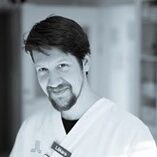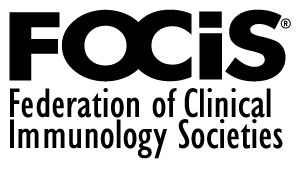Karolinska Institute in Stockholm, Sweden
About Per Marits, MD, PhD

Career path
1. How did you first get involved in immunology?
Well, I was studying medicine and during the education, I encountered a person who was about to become my future mentor, who convinced me that immunology was the field of research that was the most exciting in the future. He had just returned from the US from a postdoc and was about to start a new research group at Karolinska Institute Sweden. And I joined his group, which I never had regretted. So, that was a great start to my research career.
2. Tell us about the research you’re most proud of.
That’s quite a difficult question because I’ve done so many different things, but I’m still quite proud of what we did during my PhD studies, where we went into the field of tumor immunology, somewhat before it had become really popular. We looked for tumor reactive lymphocytes in tumor draining lymph nodes from patients with solid tumors and also based on this finding, we performed a pilot study of adoptive T-cell therapy here in Sweden, which was quite early. And I remember that most of the oncologists were quite skeptical that immunology would actually play a role in treating cancer at the time. Well, time has proven them wrong. So, I’m quite proud of that.
3. What is the most important trait a researcher should possess and why?
I think an ability to believe in his or her own ideas is very important because there are so many things that can make you doubt your own idea, that it is going to fly, that it’s going to work. When I insisted that I should read a few more papers before I actually did something, my supervisor always said you should do your experiments yourself. Before you have done the experiments, you cannot really say, irrespective of how many papers you read, you need to get your feet wet and try. I think an ability, a certain amount of self-confidence, is very important to succeed in the long-term.
4. What is the biggest lesson you’ve learned?
I think that choosing the people that you cooperate with is very, very important. When you have to get involved in different projects, you realize by trying the ones that you really work with long time, it’s not always those that are the best based on the best ideas, but rather those that are based on the best people that you like, that you really can cooperate with them. Research today is very much a team effort and having a great team surrounding you takes the best out of all the people involved. I think that’s crucial.
5. What advice would you give to young researchers just starting out in the field?
Well, that connects with what I said previously and also my own experience that what really made me become a researcher and also stay in this field. I found a mentor and a supervisor that made the subject interesting and exciting. And choosing your supervisor or choosing your group, that’s quite crucial, but perhaps even more important is the person, and that is a person with sound values and the person that you work with on the personal level. I think that’s very important.
6. Describe your average workday.
My workday is somewhat changing and very different. At the Karolinska University Hospital, both clinical immunology and transfusion medicine are combined and I’ve recently been appointed head of the clinical immunology part of that division. The recent month, my workdays have been very much meetings, meeting different people and perhaps a little less of the research part that I usually enjoy. Apart from that, I commute about one hour every day back and forth from Stockholm. I start my day by having a cup of coffee and listening to some podcast or something like that in my car and then the workday begins, which, as I said today, mostly consists of meetings. But I try to have some time looking at recent papers every day and then commute back home to my family. I spend the evening with them.
Work with FOCIS and FCE's
8. Switching gears, how did you first get involved with FOCIS?
That was also again through my previous supervisor, who was also the previous FOCIS director for Karolinska, who convinced me to go to the FOCIS meeting in 2009. Before that, I didn’t really know FOCIS well and I think it was a great, great experience. It was a great meeting. I went as a trainee and it was very inspiring meeting new people and hearing what other people were doing at the moment and seeing all this human immunology that I really lacked a bit actually. It’s different now, but I think when I was a PhD student, either there was very complex, basic immunology, or it was clinical immunology, which was mostly quite basic. So, you have these mouse immunologists, with their complex models and elegant stuff, and then you have the clinical immunology and I think this meeting proved that it was actually possible to combine the two. It was very inspiring.
9. How do you think FOCIS has changed your world?
Well, as I mentioned on the previous question, I was also meeting the new people and seeing what other people were doing and what actually was possible. I think that’s been very, very interesting. And I think that meeting people doing or that are interested in the same thing in other places, it’s a great way to get new ideas and new friends as well.
10. If your colleague asked you why they should join FOCIS, what would you tell them?
I would try to convince them to go to the FOCIS meeting. In Sweden, it coincides with the mid-summer holiday, which is quite popular around here, but I think that it’s worthwhile to go overseas to attend the conference instead, so I’ll try to convince them that it’s a good idea.
11. We’re going to talk a little bit now about your FCE. Can you tell us about the research that you’re doing?
My main focus on the recent years has been on immunodeficiency diagnostics. We have a collaboration with different clinics in Karolinska Hospital and Science for Life Laboratory in Stockholm, who do whole genome sequencing. So, we started to investigate immunodeficiency patients, with whole genome sequencing and it’s developed over the last five years or so and during this period, we also have started with the SCID screening in the neonatal screening program in Sweden. This has been a phase of building a new area in the clinic that we didn’t do before. It’s been very rewarding and now I think it’s time that we can intensify this national collaboration and also start to improve the diagnostics even more. This has been a very interesting year. We are, of course, within FOCIS, interested to connect with other labs that are doing similar things for immunodeficiency patients and also learn more and exchange data.
12. What is the vision/your dream goal of your FCE? What are the specific goals as the FCE Director?
Clinical immunology in Sweden can benefit from more international contacts and I think there are areas within clinical immunology that we could use FOCIS as a means of developing them and improving the diagnostics that we offer to the hospital. Within Karolinska, there is awareness of FOCIS. It needs to be higher and I will try to work for that when I’m FCE director, that FOCIS is something that you think of and something that people want to be a part of. I think that the trainee opportunity that’s offered every year is a great opportunity for PhD students in immunology to get involved in an international setting.
13. What are your biggest challenges?
Well, of course, in immunology, there are many collaborations and then many organizations and advertising FOCIS can be a challenge. On a personal level, I think that time management is my biggest challenge.
14. Why did you apply to be an FCE?
Do you mean why did we at the Karolinska apply to be an FCE? That’s quite before my time, so I’m not really aware of the why’s behind the application, but, in hindsight, I think it was a great idea and I know that we have had the collaborations with international FCEs, which has been very fruitful and resulted in new analysis in the clinical laboratory. There are great opportunities lying ahead of us with such collaborations.
Those are all the questions for today, thank you for your time.
